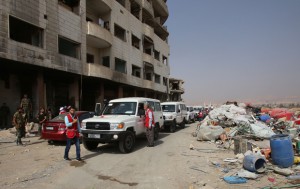Ambulances enter besieged city day after evacuation deal, with reports fighters will head to Idlib ‘or sort out their situation with the regime’
Ambulances and Red Crescent vehicles entered Syria’s besieged town of Daraya on Friday as thousands of rebels and civilians prepared to leave before its surrender to government forces.
It was unclear exactly when residents and fighters would start leaving the devastated town near the capital Damascus that has been under rebel control since 2012.
An estimated 8,000 people remain in the town, despite a government siege lasting four years and regular government bombardment.
Daraya is located just a 15 minute drive from Damascus and is even closer to the government’s Mazzeh air base.
On Thursday, Syrian state news agency SANA announced a deal had been struck for the evacuation of civilians and fighters in the town.
The agreement is regarded as a major defeat for the opposition and has provoked anger among supporters.
“Seven hundred armed men with their personal weapons will leave Daraya to head to the [rebel-controlled] city of Idlib, while thousands of men and women with their families will be taken to reception centres,” SANA said.
The rebels are largely from two groups, Ajnad al-Sham and the Martyrs of Islam. All will be told to surrender other armaments to the army.
A Syrian source on the ground said Thursday that the evacuation could take four days to complete.
A military source told AFP the army would enter Daraya, which was one of the first towns in Syria to erupt in anti-government protests in March 2011.
The civilians will go to regions under government control around Damascus, rebels will go to Idlib “or sort out their situation with the regime,” a rebel official told AFP.
Most of Idlib province, in northwest Syria, is held by the powerful Jaish al-Fatah rebel alliance.
Only one humanitarian food aid convoy has entered Daraya since government forces began their siege of the town in late 2012.
The aid convoy delivered by the Red Crescent entered Daraya in June, and contained enough food for a month, officials said.
A UN aid convoy carrying medicine but no food had entered Daraya earlier the same month.
The arrival of the food aid was followed by heavy government bombardment that residents said stalled distribution.
The bombardment was heavily criticised by the West, including France, which accused Damascus of “extraordinary duplicity”.
According to the UN, nearly 600,000 live under siege across Syria, most surrounded by government forces, although rebels and Islamists also use the tactic.
In several places, lengthy government sieges have prompted rebels to agree evacuation deals with the government, prompting activists to accuse Damascus of using “starve or surrender” tactics.
A plea for help
Middle East Eye published a passionate plea on 22 August, from 42 women living in and out of the besieged city, which urged the international community to intervene and halt the use of napalm on Daraya by pro-government forces.
The letter, headlined “On napalm and starvation: An open letter to the world from the women of Daraya,” chronicles how the Syrian government has besieged and bombed the city, including utilising napalm, a chemical weapon banned by international law.
The writers outline its use against civilians, including a napalm bombing on a hospital that put it “completely out of action”.
On top of napalm attacks, the women also detail how the government has bombed and cut off access to basic necessities such as food and electricity for years, using “starvation as a weapon”.
“At the start of 2013, the regime cut Daraya off from all basic services – electricity, water for drinking and household use and communications. Throughout the siege, regime forces have used starvation as a weapon. Now, children and adults alike are suffering from severe malnutrition,” it read.
“For more than two months, the residents of Daraya have lived with daily, continuous bombing by regime forces. We have counted the weapons used: 1,805 barrel bombs and 729 high-explosive earth-to-earth missiles. These have set fire to agricultural land and the crops that represented the sole food source for the besieged residents of the city,” the letter added.
middleeasteye.net/



